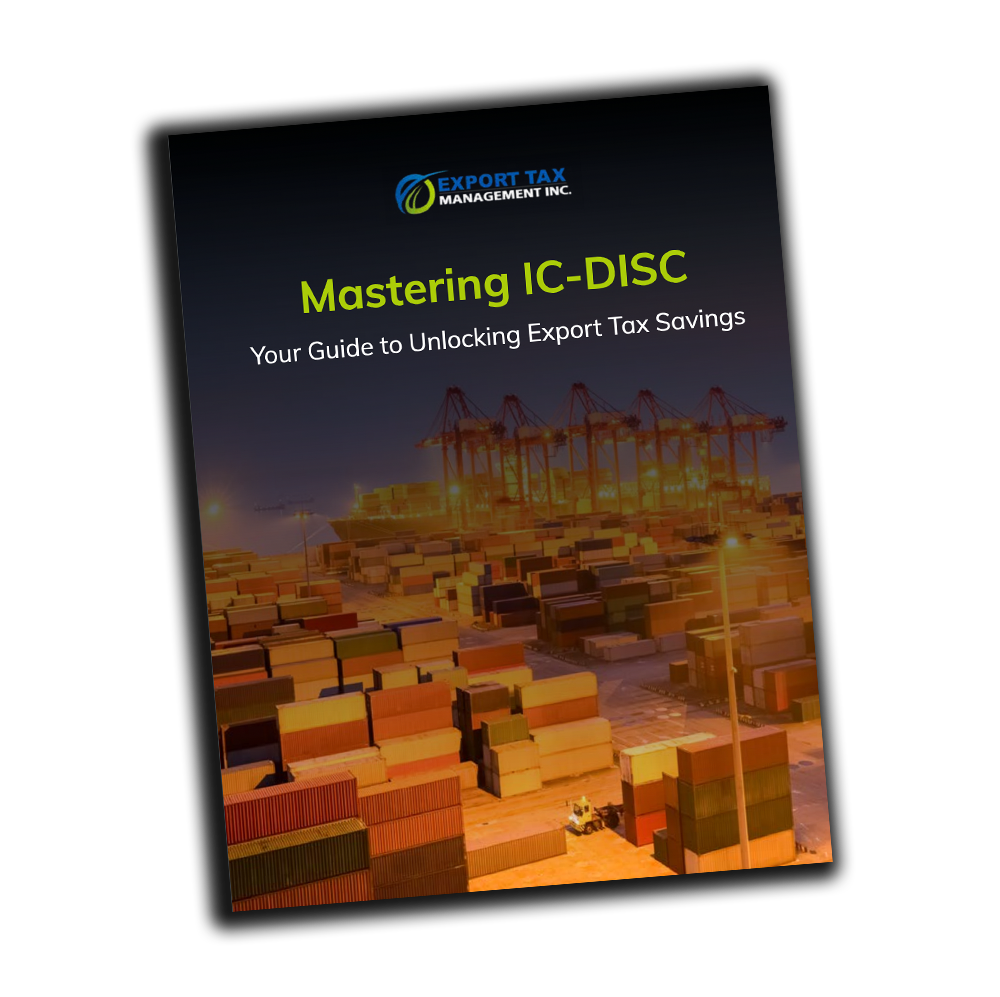How an IC-DISC Structure Can Lower Federal Taxes on Export Income
In today’s complex tax environment, the DISC tax structure continues to be a critical tool for U.S. exporters aiming to stay competitive in global markets.
For U.S. companies that export products or services, the Interest Charge Domestic International Sales Corporation (IC-DISC) remains a powerful and often underutilized federal income tax incentive. By implementing the right IC-DISC structure, eligible businesses can significantly reduce the tax burden associated with export income, leading to meaningful savings and improved cash flow.
For a comprehensive overview, visit our IC-DISC Explained guide.
Table of Contents
- Legal & Organizational Framework of a DISC
- Qualification Requirements for IC-DISC Status
- Operational Structure
- Key Advantages of the DISC Tax Structure
- Case Study
- Frequently Asked Questions
- Leveraging the DISC Tax Structure for Long-Term Success
Legal & Organizational Framework of a DISC
The IC-DISC structure operates within a specialized legal and organizational framework established by U.S. tax law to incentivize export activity.
A DISC must be a domestic corporation with a single class of stock and is required to elect DISC status by filing IRS Form 4876-A. The Interest Charge Domestic International Sales Corporation (IC-DISC) does not engage in active business operations but exists to receive commissions on export sales from the related operating company. This structure allows exporters to legally shift a portion of their profits into a tax-advantaged entity, benefiting from lower dividend tax rates. Closely-held and family-owned businesses frequently adopt this model to maximize tax efficiency.
For assistance with setting up a compliant DISC entity and other export tax solutions, visit our Export Tax Services page. To explore official tax guidelines, visit the IRS website.
Qualification Requirements for IC-DISC Status
To fully utilize the DISC tax structure, a business must satisfy stringent IRS qualification criteria.
The Interest Charge Domestic International Sales Corporation (IC-DISC) must be a U.S.-incorporated entity with only one class of stock and properly elect DISC status. A key requirement is that at least 95% of the DISC’s gross receipts must come from qualified export property — goods produced in the U.S. and sold for use outside the country. Furthermore, companies must maintain precise documentation, separate books, and submit accurate annual filings such as Form 1120-IC-DISC. Ensuring compliance with these standards is crucial to preserving the DISC’s tax benefits and avoiding IRS challenges.
For more details on required filings, visit our Form 1120-IC-DISC resource page.

Operational Structure: How a DISC Functions in Practice
Understanding how the DISC tax structure operates in practice is essential for exporters looking to maximize its benefits.
The IC-DISC earns commissions from the related exporting company based on qualified export sales. These commissions are deductible expenses for the exporter and are taxed at favorable dividend rates when distributed to DISC shareholders. Typically, the transaction flow involves calculating commissions, transferring funds to the DISC, and adhering to strict payment timing rules. Exporters must follow specific guidelines regarding commission payments to remain compliant and ensure optimal tax treatment.
To learn more about these important procedures, see our detailed overview of the IC-DISC commission payment rules.
20+ Years IC-DISC Experience
Unlock Significant Tax Benefits with IC-DISC
Our objectives are simple: to provide you with maximum export tax savings, while delivering unmatched personal attention by our staff of CPAs. Schedule a free consultation today to discuss how Export Tax Management can help you.
Schedule Free ConsultationKey Advantages of the DISC Tax Structure
The DISC tax structure offers exporters a unique opportunity to enhance profitability while maintaining compliance with U.S. tax laws. Key advantages include:
- Significant tax savings by converting ordinary income into qualified dividend income, taxed at lower rates.
- Tax deferral opportunities, allowing businesses to postpone tax payments on export profits.
- Improved cash flow, giving exporters more resources to reinvest in business growth.
- Strategic planning benefits for family-owned and closely-held businesses, including succession and estate planning.
- Simplicity and flexibility—the DISC structure does not require operational changes to the core business.
To explore these benefits in detail, visit our comprehensive guide on IC-DISC benefits. If you’re ready to implement or optimize your DISC strategy, learn more about our Export Tax Services.

Case Study: Real-World Application of the DISC Tax Structure
To illustrate the tangible benefits of the DISC tax structure, let’s look at a real-world example of a U.S.-based manufacturer leveraging an IC-DISC for export tax savings. This family-owned company produces specialized industrial equipment and exports a significant portion of its products to international markets.
Challenge:
Despite steady growth in exports, the company faced high federal income tax liabilities, reducing overall profitability and limiting cash flow for reinvestment.
Solution:
By establishing an Interest Charge Domestic International Sales Corporation (IC-DISC), the company was able to:
- Pay commissions to the DISC based on qualified export sales.
- Deduct these commissions from its taxable income.
- Distribute the DISC’s income to shareholders as qualified dividends taxed at a lower rate.
Result:
The IC-DISC resulted in:
- Annual federal tax savings exceeding $500,000.
- Improved cash flow, which was reinvested into R&D and global expansion.
- Enhanced long-term financial planning for the company’s shareholders.
This case highlights how strategic use of the DISC tax structure can provide substantial tax relief and support business growth. For more practical examples of IC-DISC in action, visit our detailed IC-DISC Example page.
If you want to take your international business to the next level, IC-DISC is the answer. Check out our related articles:
Frequently Asked Questions (FAQs)
A DISC (Domestic International Sales Corporation) is a U.S. tax-exempt entity that allows exporters to reduce their tax liability on profits from qualified export sales. From an accounting perspective, a DISC functions as a separate legal entity that receives commissions from the operating company. These commissions are deductible for the exporter and generate income for the DISC, which is then taxed at the favorable qualified dividend rate when distributed to shareholders.
The IC-DISC enables U.S. exporters to create a tax-exempt corporation that receives commissions based on export sales. The exporter deducts these commissions as an expense, reducing taxable income. Meanwhile, the IC-DISC’s income is taxed to shareholders at the lower qualified dividend rate, resulting in significant federal tax savings without altering the exporter’s core operations.
IC-DISC commissions are calculated using the greater of two methods:
– 4% of qualified export receipts, or
– 50% of export net income Exporters can choose the method that yields the highest commission benefit. Proper calculation is essential to maximize savings and comply with IRS rules.
A typical example involves a U.S. manufacturer exporting machinery abroad. By setting up an IC-DISC, the company pays deductible commissions to the DISC based on its export sales. The DISC’s income is later distributed to shareholders as qualified dividends, effectively lowering the overall tax rate on those profits.
Yes, despite changes in tax legislation, the IC-DISC remains the only statutory export incentive available today. It continues to provide substantial tax benefits for qualifying U.S. exporters, especially for closely-held businesses looking to reduce tax liabilities on export profits.
For more in-depth answers to these and other questions, be sure to visit our complete IC-DISC FAQ page.
20+ Years IC-DISC Experience
Unlock Significant Tax Benefits with IC-DISC
Our objectives are simple: to provide you with maximum export tax savings, while delivering unmatched personal attention by our staff of CPAs. Schedule a free consultation today to discuss how Export Tax Management can help you.
Schedule Free ConsultationLeveraging the DISC Tax Structure for Long-Term Success
The DISC tax structure remains one of the most effective export tax incentives for U.S. businesses seeking to reduce their federal tax liabilities and enhance international competitiveness. By channeling export profits through an IC-DISC, companies benefit from lower tax rates, improved cash flow, and strategic financial advantages—all while staying fully compliant with U.S. tax laws.
However, the true value of an IC-DISC lies in its proper setup, management, and alignment with your business goals. Partnering with experienced professionals ensures that you maximize these benefits without falling into compliance traps. If you’re ready to explore how your company can benefit, schedule a consultation with our experts.
For a full overview of how we support exporters with IC-DISC and other tax-saving strategies, visit our Export Tax Services page.




